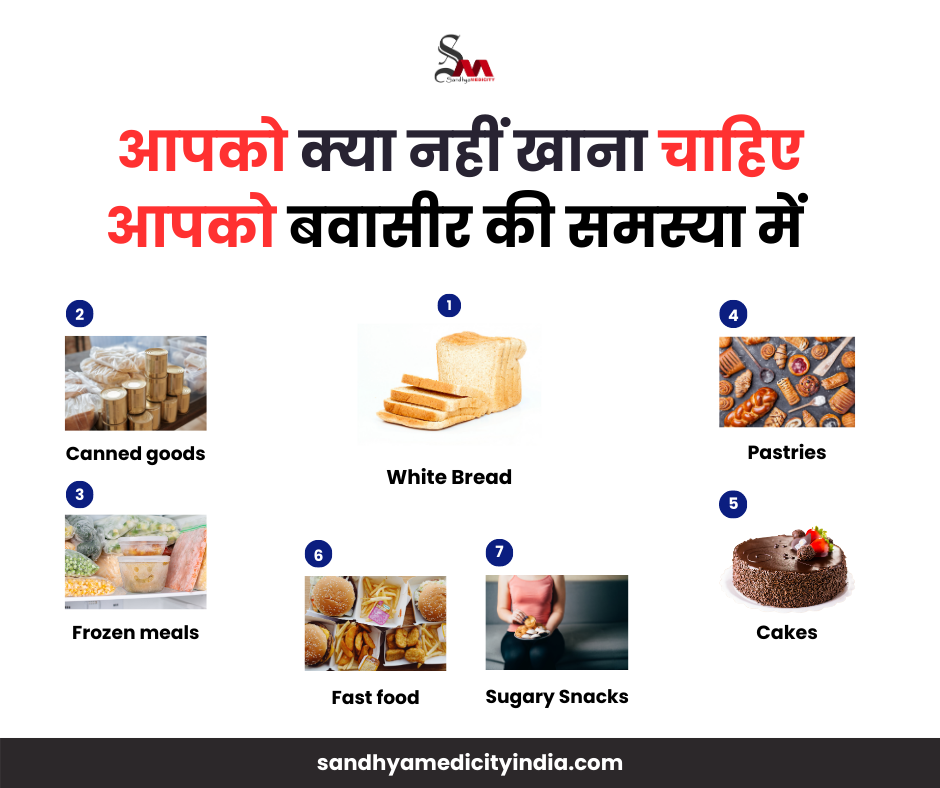Table of Contents
We’re delving into an important topic that affects millions of people worldwide – piles. Specifically, we’ll be discussing the foods avoid in Piles Disease that can exacerbate this uncomfortable condition.
So, if you or someone you know is dealing with piles, make sure to stick around as we uncover the culprits behind this issue. Let’s get started!
Understanding Piles
To truly comprehend which foods are not good for piles, it’s crucial to understand what piles are and how they occur. Also known as hemorrhoids, piles are swollen and inflamed blood vessels located in the rectum or anus.
Foods avoid in Piles Disease

Now, let’s discuss the foods that can exacerbate piles and potentially worsen the symptoms. The first group of foods to avoid are those high in refined carbohydrates. Foods like:
- White bread,
- Pastries,
- Cakes, and
- Sugary Snacks
can lead to constipation, a primary trigger for piles. The lack of fiber in these foods hinders proper digestion and contributes to hard stools, putting strain on the blood vessels in the rectal area.
Another category to steer clear of comprises processed foods and those with high sodium content. These foods commonly include
- Fast food,
- Frozen meals, and
- Canned goods.
High sodium intake can lead to water retention, causing the body to retain fluids and potentially lead to swelling and inflammation of the blood vessels.
In addition, spicy foods should be consumed with caution if you have piles. While it varies from person to person, spicy foods can be irritating to the digestive system, making bowel movements more painful and leading to discomfort for individuals with piles.
Spicy Foods
It is recommended to moderate the consumption of spicy foods and pay attention to how they affect your symptoms.
Optimal Diet for Piles
Now that we’ve explored foods avoid in Piles Disease, let’s shift our focus to the foods that can actually help in managing this condition. First and foremost, incorporating a high-fiber diet is essential.
Foods like whole grains, fruits, vegetables, and legumes are rich in fiber, promoting regular bowel movements and reducing the strain on blood vessels. Additionally, these foods aid in softening stools, reducing the potential for irritation.”
Full Diet What to Eat In Piles Disease – Check
Hydration
“is also key for individuals with piles. Drinking an adequate amount of water throughout the day supports proper digestion and softens stools, making them easier to pass. It is generally recommended to consume at least eight glasses of water daily, but this amount may vary based on an individual’s specific needs.”
Lifestyle Practices
While diet plays a significant role in maintaining optimal digestive health, there are other lifestyle practices that can support individuals with piles.
Regular exercise:
- walking,
- swimming, or
- yoga,
helps stimulate bowel movements, preventing constipation and reducing the risk of piles. Maintaining a healthy weight is also important, as excessive weight can put added pressure on blood vessels in the rectal area.”
Additionally, avoiding long periods of sitting or standing, which can lead to restricted blood flow, is crucial.
Taking breaks, using supportive cushions, and practicing proper posture can alleviate some of the pressure on the rectal area and minimize the risk of piles.
CONCLUSION
The foods that are not good for piles.
Remember, incorporating a balanced diet rich in fiber, staying hydrated, and adopting healthy lifestyle practices can go a long way in managing and preventing piles. As always, we encourage you to consult with a healthcare professional for personalized advice tailored to your specific needs.
Book Appointment
Related Piles Disease:
- Piles (Hemorrhoids) Disease Treatment
- 5 Best Type of Foods Eat in Piles Disease
- How to Effectively Reduce Piles Fast the Best Ayurvedic Way?
